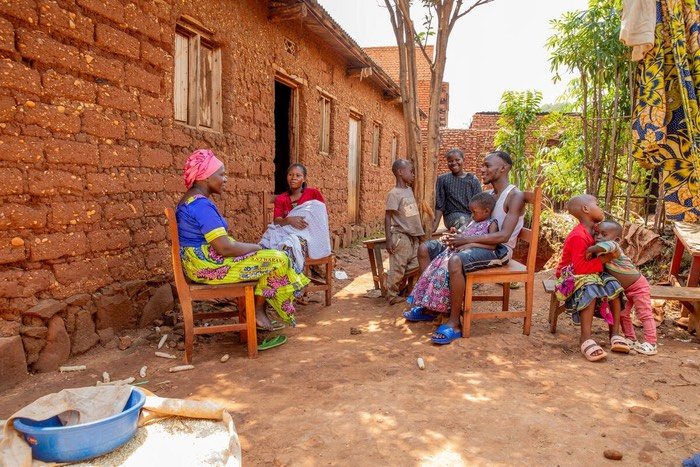
Chancelline, her husband Ishara and their children sit outside their Burundian host Charlotte’s house in Rugombo, Cibitoke Province, Burundi. © UNHCR/Charity Nzomo
By Faith Kasina in Rugombo, Burundi
More than 71,000 Congolese refugees have crossed into Burundi since January, the largest influx in decades. Thousands have been moved to safer sites, but vital aid is lacking due to a critical shortage of funds.
Chancelline Karekezi stood quietly in line, her three-week-old baby cradled in her arms, inside a local stadium in Rugombo commune, northern Burundi, where thousands of newly arrived Congolese refugees wait to be registered. The 26-year-old mother of five was still recovering from the birth when she and her children fled deadly conflict in her hometown in Kamaniola, in the South Kivu province of the Democratic Republic of the Congo (DRC).
“That night, when we were still asleep, we heard loud bangs and gunfire outside and the sound of people running. Shortly after, three men with guns knocked on our door demanding that my husband transport them with his motorcycle to where the rest of the troop was,” Chancelline recalled. “He refused, and when they threatened to shoot him, he managed to escape. I started screaming for help and that’s when the men also fled.”
Fearing for her life and seeing her neighbours fleeing, she decided to pack a few clothes and escape with her young children. They walked for three arduous days and nights through the forest with little food or water.
“I did not know where I was going, but I was not going to stay home and wait for death,” she said. “We walked for so long without stopping because I was afraid that those armed men would catch up with us. I was still healing from giving birth to my baby three days before, but I had to keep walking,” she said.
They arrived at the border hungry and exhausted, resting for a few hours before attempting to cross the Rusizi River – 300 metres wide with fast-moving currents – to make it into Burundi. Stories of people drowning after being washed away filled her thoughts as she clung to her children in the boat and made it to the other side with the help of others fleeing.
This year alone, escalating conflict across eastern DRC has displaced more than 400,000 people, including many who previously fled their homes to escape violence. Persistent clashes continue to claim civilian lives and provoke widespread human rights violations, including murder, looting, injuries, kidnappings and arbitrary arrests of displaced people. Vulnerable women, children and older people are among those living in overcrowded sites and precarious conditions with limited access to food, water and essential services.
Of the displaced, over 133,000 people have fled to neighbouring countries. Chancelline is among more than 71,000 who have crossed into Burundi since January 2025, the largest influx the country has experienced in decades. However, a critical lack of humanitarian funding is hampering efforts to meet the basic needs of the newly arrived refugees.
Despite reaching safety and reuniting with her husband Ishara, there was no space for the family in the Rugombo stadium, a few kilometres from the border where the majority of the refugees were sheltering. Their only alternative was to sleep in an open field near a local school close to the stadium, where other refugee families were sheltering. Thankfully, a Burundian family graciously took them in, sharing what little room and food they had.
“I saw the state they were in; it was raining … My heart could not let me sleep in the house and leave them out in the cold, so I welcomed them to my home,” said Charlotte Mbomamkira, a Burundian mother who had fled to the DRC as a refugee years before.
UNHCR, the UN Refugee Agency, is working with the Government of Burundi to register new arrivals and move them to safer locations away from the border where they can receive support. One such location is the Musenyi refugee site in the south of the country, where more than 14,000 refugees – including Chancelline and her family – have been relocated.
But due to the current funding shortages, food is in short supply and health services are stretched to breaking point, risking the spread of deadly diseases such as cholera. A new site to host refugee arrivals is already over capacity. Services for refugees with additional protection needs are also under strain, including for over 400 unaccompanied and separated children and survivors of sexual violence.
UNHCR and other UN and NGO partners need $76.5 million to protect and assist a projected 90,000 Congolese refugees in Burundi between March and September 2025.
Life as a refugee may not have been in her plans, but Chancelline hopes that if they get the support they need, their situation will improve.
“I am happy we have arrived, we can now rest,” she said after arriving in Musenyi. “I would rather stay here where there is peace [and] I hope I can find work to help me provide for my family.” [ Source : UNHCR]. (End)
